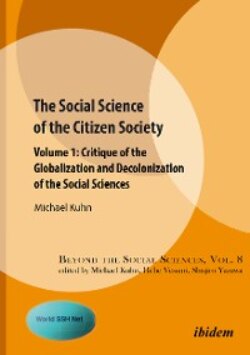Оглавление
Michael Kuhn. The Social Science of the Citizen Society
Hebe Vessuri, Universidad Nacional Autónoma de México (UNAM), Mexico City
Preface
Introduction: The “Globalization” and “De-colonization” of the Social Sciences1
Globalization
De-colonization
1. The “Globalization” of the Social Sciences—the Introduction of Nationalist Thinking into Social Science Thinking
1.1 Social sciences before their “globalization”: Idealizations of citizen societies and their state
Thinking from the perspective of the citizens—theories as a recipe for a domesticated materialism
Lessons about “Auschwitz”—citizen societies and the refinement of the missions of their state
The Vietnam War—a challenge for the cohesion of a citizen society
1.2 Globalized theories—nationalistic self-portraits of states
Nationalistic self-portraits of states
The refinement of states as a protection against the world of states called “globalization”
Science as a global seismograph of nationalism—about the stale luck to have caught the right state
1.3 Comments on life in the world of national citizen societies and its social sciences legends
2. The Final Worldwide Enforcement of the Social Science of the Citizen Society through Its “De-colonization”
2.1 The adoption of the knowledge concept of social sciences in the former colonized world through the critique of “Eurocentrism”
2.2 The place of thinking as the “contextual” source of knowledge
2.3 From the critique of capitalism to its anti-critique—from Marx to Heidegger
3. Indigenous Knowledge—Contributions to the Ideological Armament of States. 3.1 State self-portraits of indigenous knowledge
Indigenized knowledge
Indigenized Science
3.2 Indigenized Knowledge in global discourse
3.3 How the de-colonized social sciences view the world of science—and its ideological harvests
4.The Final Scientific Highlights of the Masterminds of Globalized Post-colonial Thinking
4.1 Imperialisms as a methodological instrument of social science theory-building
4.2 Imperial theories—for morally clean wars
5. Old and New Mistakes and Their Sources: Theoretical Legacies of the Globalization and Decolonization Debates under the Preparatory Work of HistoMat
Отрывок из книги
ibidem-Press, Stuttgart
The social sciences, what do they let us know about the world's social, a place of war, of poverty, and of wealth? Certainly, one cannot make them responsible for what is going on in the world. Is there any spot on the globe that is not somehow involved in a war? Is there any place in the world, where the growth of wealth does not exist next to the growth of poverty? Certainly, war, wealth, and poverty are the major essentials of "modernity" and they have been in the forefront of social concern for more than 200 years. The social sciences have been researching the social world with a multitude of professional thinkers also for over two centuries. Has the knowledge they gained helped to make anything better, or at least helped to reduce wars and poverty? Obviously not. Or is even the opposite is the case? Again, one cannot accuse the social sciences for this, knowledge is knowledge, but what is their impact upon the world? Not much, one must conclude, considering the fact that we still live in a world of war, wealth, and poverty. Hence, we have to raise the question what social thought under the regime of the social sciences is all about then.
.....
3.3 How the de-colonized social sciences view the world of science—and its ideological harvests
4.The Final Scientific Highlights of the Masterminds of Globalized Post-colonial Thinking
.....
